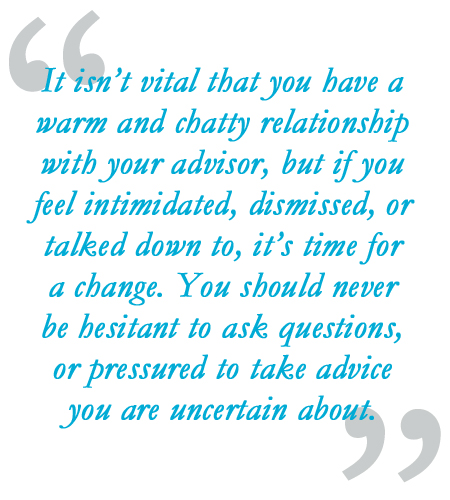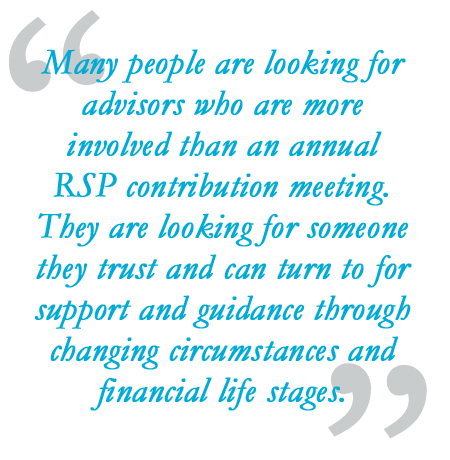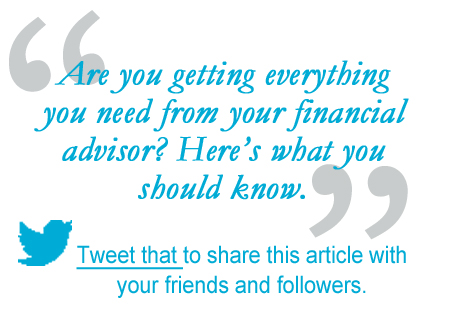By Steve Bridge, B.A. (Hons.), FPSC Level 1®
How did you choose your investment advisor? If you are like many Canadians, your advisor is the one who had an open slot when you called your bank for an appointment, three, five or even 10+ years ago. Or perhaps you met your financial advisor in another haphazard way; your best friend’s son sells investments, or your boss’s daughter is a financial advisor. But things are changing and you deserve better.

Canadians want to know that they are getting investment advice from someone who understands their unique situation and needs, someone who has their best interests at heart, and someone who is their financial ally. Canadians need investment advisors that are paid fairly and deliver advice that moves them closer to their financial goals.
The financial advice you follow today will significantly impact your life in retirement. That’s why breaking up with your investment advisor—could be the most important financial decision you make this year.
But before you act, it’s important to understand what you need from a financial advisor relationship, and how to best make a change if necessary. This three step process provides everything you need to make an informed, thoughtful decision.
Step 1 – Get Clarity on Why You Want to Change Investment Advisors
There are three areas to consider when evaluating your current investment advisor: his/her performance, the relationship dynamic, and your needs. Let’s take a look at what you should consider for each point.
Fees and Performance
Starting this year, thanks to Phase 2 of the Client Relationship Model (CRM2), Canadian investors will receive two reports that outline information that was previously difficult to obtain: a report on the advisory fees and charges incurred within their investment accounts, and a report on how well their investments are performing. It’s important that you fully understand the strengths and weaknesses of the two new CRM2 reports.
For the first time, you will be able to see just how much your investment advisor is being paid in commissions and fees, for the ‘free advice’ he or she provides. Many people are in for quite a surprise, especially if their investments aren’t performing as well as they expected. Even if you are happy with your return on investment, you may be paying more in fees than is necessary.
Relationship dynamic
It isn’t vital that you have a warm and chatty relationship with your advisor, but if you feel intimidated, dismissed, or talked down to, it’s time for a change. You should never be  hesitant to ask questions, or pressured to take advice you are uncertain about. A good client/advisor relationship is one in which your goals and circumstances are taken into consideration; no cookie-cutter investment plans, and no high pressure sales. A financial meeting shouldn’t feel like a trip to the principal’s office.
hesitant to ask questions, or pressured to take advice you are uncertain about. A good client/advisor relationship is one in which your goals and circumstances are taken into consideration; no cookie-cutter investment plans, and no high pressure sales. A financial meeting shouldn’t feel like a trip to the principal’s office.
Your needs
Many Canadians need more from their financial advisor than advice on how to invest and construct the optimal portfolio—improved financial well-being must consider much more.
What are your needs beyond investing? Are you interested in having a financial professional help you with goal setting and cash flow management? Is that something your current investment advisor provides?
Many people are looking for advisors who are more involved than an annual RSP contribution meeting. They are looking for someone they trust and can turn to for support and guidance through changing circumstances and financial life stages. Once you have developed a list of what you require of a financial advisor, you should begin your search for a suitable match.
 Step 2 – Find Your New Investment Advisor
Step 2 – Find Your New Investment Advisor
You can find potential new advisors through your own computer searches or through referrals from friends. Set up meetings with those that appear to fit your newly determined requirements, and go into those interviews prepared with questions.
Money Coach Noel D’Souza wrote an extensive post on questions to ask your financial advisor. Here is a summary of his suggestions:
When interviewing prospective advisors remember to ask about their background and experience, professional designations, what services they provide, in which areas are they able—or not able—to give advice, and which professional associations they belong to. If possible, get testimonials from past clients. Pin down the details:
- How do you work with clients? In person/online/phone?
- How often do you meet? If you meet in person, where do you meet?
- When are you able to meet?
- How many clients do you work with at a time?
- What are your fees?
- How do you get paid? Do you receive commissions or referral fees? Do you pay commissions or referral fees?
We all know how difficult it can be to talk about money. It’s important that you are comfortable being open and honest, and that you are comfortable with how this advisor offers advice. But Noel cautions that while, “it’s important that your advisor acknowledges what is important to you and respects your values and choices,” that isn’t the same as, “your advisor always agreeing with you or telling you what you want to hear.”
Once you have found someone you want to work with, it’s time to speak to your current investment advisor.
 Step 3 – Inform Your Investment Advisor
Step 3 – Inform Your Investment Advisor
This is often an uncomfortable step for many people. As a nation jokingly known for apologizing to a door if we bump into it, the idea of ‘hurting someone’s feelings’ can leave us vulnerable to accepting the status quo, even when it’s not in our best interest. That’s not a big deal if we’re politely loyal to a hair stylist that under performs, but it’s a very big deal when it comes to our money. Where your financial future is concerned, your only loyalty is to yourself and your family.
Breaking up with an advisor can be handled several ways, but to ensure a smooth transition, don’t do anything until you have an agreement in place with a new advisor. Once that’s done you can handle the shift in some variation of these three ways:
- A conversation. This option can be handled in person or over the phone. Whether this option is best for you will depend on your personality and possibly even the personality of your advisor. You want this to be a conversation, not an attack or a debate. In a best case scenario you would thank your advisor for his/her service but explain either 1. The real reasons you are switching, whether that’s fees, level of service or something else. Or 2. Give them some version of “I’ve decided to get a fresh perspective.” The downside of a conversation is that your advisor may try to convince you to stay. It’s important that you are clear and certain of your decision, so you don’t get ‘guilted’ or bullied into changing your mind.
- An email. Sending your advisor an email is less personal than talking, but may be a better fit if you really feel uncomfortable with a conversation. But like with a conversation, whether you choose to be upfront or politely vague, be respectful and firm. It is possible your advisor will call you, either to wish you well or to convince you to stay, so be prepared to stand by your decision.
- Let the new advisor handle it. You can simply let your new advisor initiate the paperwork that will be sent to your current advisor. But this isn’t really the best way to have your current advisor find out the news, especially if you have had a reasonably positive relationship.
Whichever way you decide to break the news to your investment advisor, remember that this isn’t likely the first time that a client has left them. It’s even likely that they have clients who left other advisors to come work with them. At the end of the day, you have to put your financial needs first.
A Few Final Thoughts
If you’ve made the decision that your relationship with your current investment advisor is not working, and that a change is required, you need to consider what you want from a financial advisor—investing or comprehensive financial planning.
- An investment advisor will manage and help build your portfolio of specific investment products.
- A comprehensive financial planner will help you create a strategy for minimizing taxes, paying down debt, setting short, medium and long-term investment goals, saving for your kid’s education, your retirement, Estate planning and generally guiding you towards good money management habits.
While some financial planners offer both investment management and financial planning, there could be conflict of interest on the advice you receive. Your best bet, is to find an investment advisor who is focused on providing excellent investment advice at a reasonable fee, and hire a fee-for-service financial planner, (who doesn’t receive commissions or referral fees), to take care of everything else critical to enhancing your financial well-being.
Your, advice-only, or fee-for-service financial planner, can work with you to create a conflict-free financial plan, and help you find and implement the optimal investment management solution.
As the old Neil Sedaka song says; breaking up is hard to do. But Canadians are becoming increasingly money savvy and expect more from their financial advisor than a meeting once per year. Breaking up may be hard, but it’s harder to live with the consequences—like an ill planned retirement—thanks to a financial partnership that isn’t serving you.
We hope this article has been helpful and provided some practical advice on how you can improve your financial well-being. If you need additional support, please contact one of our Money Coaches today.



Awesome post and very informative! Thank you for the tips.